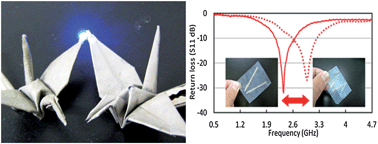Researchers from Osaka University, Japan, have developed foldable nanopaper antennas by fabricating a cellulose nanofiber substrate and imprinting silver nanowires on the surface.
The authors compiled nanopaper sheets from nanofibrillated pulp fibers, without conventional high pressure processing, to produce sheets with diameters ranging from 15 to 60 nm and a high smoothness of 0.16 μm. The nanopaper surfaces were found to be 15-80 times smoother than pulp papers – a quality required for effective electrical properties in devices. The silver nanowires were synthesized by reducing silver nitrate in the presence of PVP in ethylene glycol. This produced silver nanowires 100 nm in diameter with lengths of between 5-10 μm. The nanowires were mixed with ethylene glycol to produce pastes, which were subsequently mask-printed onto the nanopaper substrate.
To test the durability of the nanopaper-silver nanowire devices, the authors folded the paper into origami cranes, which was used to power an LED light. This demonstrated that, even with multiple folding, the nanopaper devices retain their electrical properties more consistently than folded pulp papers. This research has demonstrated, for the first time, that durable folded nanopaper devices with printed silver nanowire antennas can be easily and reproducibly fabricated. The authors envisage these antennas could herald a new wave of foldable electronic devices, such as those used in smart phones and laptop computers.
by Dr Lee Barrett
Read this HOT Nanoscale article in full:
Foldable nanopaper antennas for origami electronics
Masaya Nogi, Natsuki Komoda, Kanji Otsuka and Katsuaki Suganuma
DOI: 10.1039/C3NR00231D











